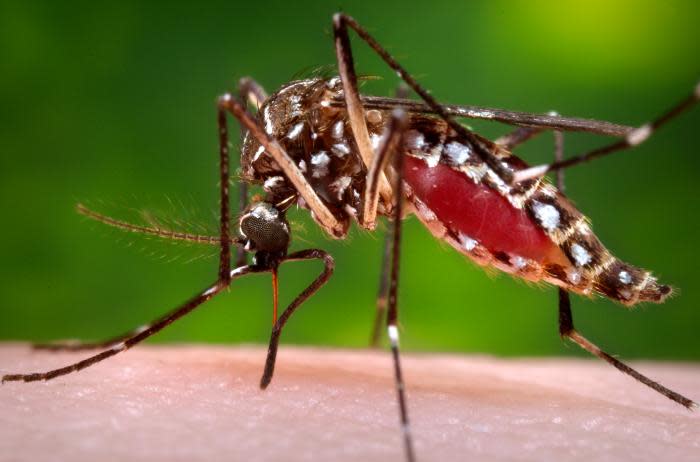Mosquito season is here. How can New Hanover County control them?

Poet D. H. Lawrence writes “Settle and stand on long thin shanks. Eyeing me sideways, and cunningly conscious that I am aware, you speck. I hate the way you lurch off sideways into air having read my thoughts against you. Come then, let us play at unawares, and see who wins in this sly game of bluff. Man or mosquito.” The warm summer temperatures and standing water indicate that mosquito season is officially underway in New Hanover County. Do we play this game of bluff with the nearly weightless phantoms, or can we play a role in controlling the mosquito population?
“It doesn’t take much water or time for mosquitoes to breed and become a problem. They only need one tablespoon of water and a week to go from a larva to an adult insect,” said New Hanover County health director David Howard. “These bugs are more than an annoyance. They can have serious impacts to community health as they’re capable of carrying diseases like West Nile Virus.”
To help keep the mosquito population in-check around your residence, New Hanover County Health and Humans Services Mosquito Control advises residents to prevent your yard from becoming a mosquito breeding ground by dumping water from any open outdoor containers and store them inside or with a cover. For larger containers or non/low-flowing ditches where standing water might form, New Hanover County has free larvicide tablets available at the Government Center, 230 Government Center Drive, Suite 140, while supplies last.
Larvicides may also be purchased at local home improvement stores or online. Mosquito Dunks are safe for use around birds, wildlife, children, and pets. The active ingredient, Bti, is a bacterium that only affects the larvae of mosquitoes, black flies, and fungus gnats. Doug Tallamy, author of “Bringing Nature Home,” and professor with University of Delaware Department of Entomology and Wildlife Ecology suggests an easy, innovative method to put this natural bacterium to work in this video, https://www.youtube.com/watch?v=TqcDZDNtP-0&feature=youtu.be.
To keep yourself from the nuisance insect, reduce time spent outdoors in early morning and evening hours when mosquitoes are most active. Keep your window screens in good shape and fitting tightly. Wear lightweight and long-sleeved shirts and pant, and focus on wearing colors mosquitoes ignore like white, blue, green and purple. Apply mosquito repellent containing active ingredients such as DEET, Oil of Lemon Eucalyptus, Picaridin or IR3535 to exposed skin areas following the label directions.
The county’s Mosquito Control works to monitor mosquito activity around the county by using traps to capture and analyze different species to determine areas where increased activity is taking place and how to effectively treat the situation. This team uses a variety of population control methods, including mosquito prevention education, larvicide to target larvae and breeding sites, mosquito larvae eating fish, habitat mitigation for source reduction and ultra-low volume mosquito spraying with EPA-registered pesticide.
Spraying typically occurs in late spring into early fall across 29 spray zones throughout the county. Residents can see a mosquito spray zone map and sign up to get spraying alerts when they are scheduled for their area or learn more about the Mosquito Control team by visiting health.nhcgov.com. This automated notification system sends text messages and/or phone calls to announce mosquito spraying in your area, typically sent on the day of spraying.
Sign up for automated alerts about mosquito spraying in your area.
The poet Lawrence concludes “I behold you stand for a second enspasmed in oblivion, obscenely ecstasied sucking live blood. My blood. Such silence, such suspended transport, such gorging, such obscenity of trespass. Queer, what a big stain my sucked blood makes beside the infinitesimal faint smear of you! Queer, what a dim dark smudge you have disappeared into!”

Lloyd Singleton is the director, N.C. Cooperative Extension, New Hanover County Center and Arboretum, located at 6206 Oleander Drive, Wilmington. The Arboretum grounds are free and open daily from 8 a.m.–5 p.m. He can be reached at 910-798-7660 or lsingleton@nhcgov.com.
This article originally appeared on Wilmington StarNews: How can New Hanover County control mosquitoes?

